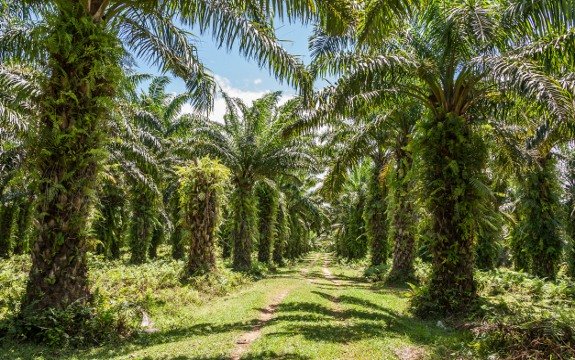Junk Food Palm Oil Production Leading to Massive Deforestation, Slave Labor, and Pollution

 Palm oil is a favorite of the processed foods industry. It is used in the production of chocolates, fried goods, and various other foods that need a cheap, smooth texture. But palm oil isn’t always produced and obtained in the most humane way. As a matter of fact, much of it is linked to rainforest deforestation, slave labor, pollution, child labor, and the destruction of orangutan populations. How do we know that the palm oil in our foods is “conflict-free”? In all honesty, we don’t.
Palm oil is a favorite of the processed foods industry. It is used in the production of chocolates, fried goods, and various other foods that need a cheap, smooth texture. But palm oil isn’t always produced and obtained in the most humane way. As a matter of fact, much of it is linked to rainforest deforestation, slave labor, pollution, child labor, and the destruction of orangutan populations. How do we know that the palm oil in our foods is “conflict-free”? In all honesty, we don’t.
Known as conflict palm oil, much of the palm oil produced in Indonesia and Malaysia is done so by wiping out huge swaths of rainforest to plant palm. For many, one of the most disturbing effect from this is the eradication of orangutans in their natural habitat.
“We could see orangutans go extinct at a species in our lifetimes,” said Laurel Sutherlin of the Rainforest Action Network (RAN). “If that happens, to save a few pennies per package on junk food, it would just be a tragedy that would be hard to stomach.”
In addition to this conflict palm oil, however, there are palm producers in other regions that are producing responsibly. The problem is that huge food makers don’t differentiate. They put all of the palm oil in one mass shipment so there is no separating the stuff originating from conflict zones and those from ethical, responsible farms.
RAN determined that if they can target the 20 largest snack food manufacturers and users of palm oil, they may be able to sway the entire industry into greater accountability for their palm oil origins. They deemed these food makers the “Snack Food 20.”
Collectively, the Snack Food 20 grosses $432 billion every single year by selling their products on the world market. These are huge corporations which include: Cargill, Dunkin Brands, Mars, Inc., Unilever, The JM Smucker Company, The Hershey Company, and General Mills, Inc.
“Together they really do have the leverage on the market to make demands,” said Sutherlin. “They have the power to change the way palm oil is produced.”
RAN is working to contact key members of these corporations—decision makers and those with influence—in hopes of getting some response and subsequent action. While they handle the phone calls and meetings, they are asking for the public’s help.
As reported by AlterNet, the RAN will send you stickers to place on potentially conflict-palm oil-containing foods. They also provide an app that will alert you to the inclusion of palm oil in foods. Just another reason to avoid processed junk.
